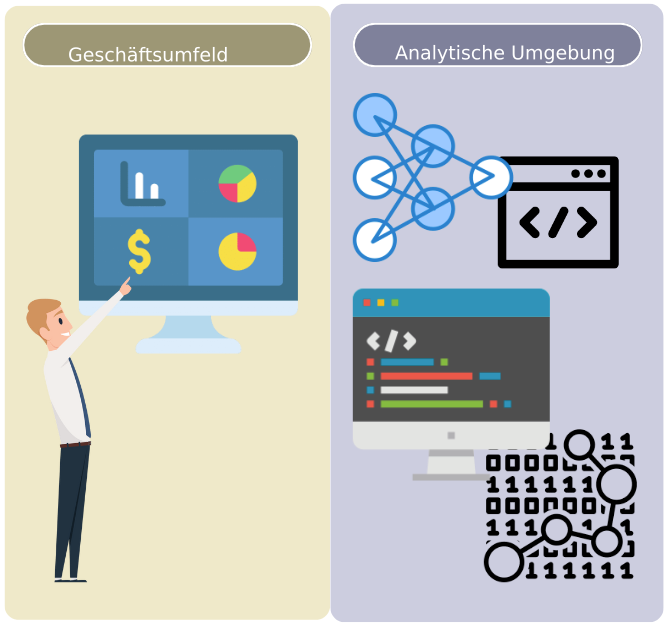Herausforderungen bei der Umwandlung von Geschäftsfragen
Analytische Fragen formulieren

Konstantinos Kattidis
Data Analytics Lead
Die Bedeutung des Übersetzungsprozesses
- Identifizieren der Daten zur Beantwortung der Fragen
- Wahl der optimalen analytischen Lösung, die Mehrwert liefert
- Vereinfachten der Kommunikation und Zusammenarbeit
- Mehr Vertrauen und Wertschätzung zwischen Geschäftsteams und Analyseteams

Herausforderungen beim Übersetzungsprozess
Betrachten wir folgendes Szenario:
1 – Ein Geschäftsteam schickt eine Anfrage mit wenig Hintergrundinformationen an das Analyseteam.
2 – Das Analyseteam führt zeitnah die Analyse durch.
3 – Das Analyseteam liefert die Lösung an das Unternehmen.
4 – Die gelieferte Lösung ändert nichts am Geschäftsproblem.

Das Geschäftsproblem verstehen

Die Geschäftsfragen sind oft in geschäftssprachlich formuliert und liefern wenig Informationen.
Idealer Ansatz: beide Teams stellen sich eine Reihe von Rückfragen
Ziel: Verstehen der Geschäftsziele, der Zielgruppe und der Einschränkungen oder Grenzen
Das Geschäftsproblem verstehen

Grund:
- Eine schnelllebige Geschäftswelt mit engen Deadlines
- Analyseteam will Unternehmen nicht mit zu vielen Details belasten
Relevante analytische Fragen formulieren

Geschäftsteams wissen oft nicht genau, wie datengestützte Analysemethoden ihnen bei ihren Zielen helfen können.
Grund: Große Lücke zwischen:
Geschäftsstrategien und -prozessen
und
Daten und Algorithmen.
Relevante analytische Fragen formulieren

- Analyseteams sind oft auf ihre eigene Sichtweise fixiert und stecken tief in den Daten und Algorithmen.
- Sie konzentrieren sich auf die Lösung, z. B. Clustering oder Klassifizierung.
- Beide Seiten haben unterschiedliche Ziele und Vorgehensweisen.
- Die Daten sind vielleicht nicht verfügbar oder nicht gut genug.
Wahl der richtigen analytischen Lösung
- Es kann verschiedene analytische Lösungen geben, die geeignet sind.
- Die Auswahl der für die Daten und Geschäftsfragen passenden Lösung kann schwierig sein.

Die Lücke schließen

Wir brauchen Best Practices, die uns Folgendes ermöglichen:
- Effiziente Übersetzung der Geschäftsprobleme in analytische Fragen
- Auswahl der richtigen Lösungen, die Geschäft positiv beeinflussen
Lass uns üben!
Analytische Fragen formulieren

